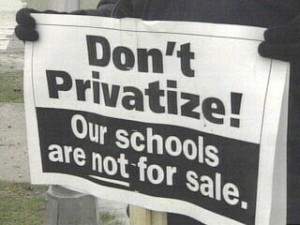
Even if the CEO responsible for the curriculum is making a profit.
One of the arguments I hear from people determined to limit school choice options is that private companies shouldn’t be involved in the business of educating our kids. Activists against accountability rail against corporations that administer tests. Charter school opponents argue that for-profit companies are trying to profit from our children. Anti-choice proponents label those of us involved in school choice as conspirators in an effort to privatize public education.
The truth is, numerous companies conduct legitimate and valuable business with our public schools. These entities produce textbooks, assessments, curriculum guides, software, and so much more. Schools could not effectively educate students without these supplemental tools and supplies.
But for the sake of argument, let’s put aside those facts and consider this:
Like thousands of other kids across the country, my own children benefit from the involvement of a huge, international conglomerate, an important player in one of this country’s most popular magnet programs – the International Baccalaureate program.
According to its website, “the IB works with 3,665 schools in 146 countries to offer the four IB programmes to approximately 1,133,000 students.”
How’s that for outside involvement?
My children attend an IB program at Williams Middle School in Tampa, Fla. I’ve been both a member of the school’s PTA and an elected officer for the past three years. As such, I’ve never heard a single parent complain about the fact that a foreign company is operating in Hillsborough County schools, nor have I heard anyone complain about lack of local control. In fact, parents aren’t complaining at all. They are lining up to get their kids into the program. Many don’t even know the background of this Geneva-based organization and even fewer seem to care.
All they know is the program works for their kids.
That’s what matters.
Another criticism leveled against school choice is that charter schools and private schools allegedly cherry-pick their students. Their logic goes that since traditional public schools don’t cherry pick students, they shouldn’t be compared to charters and private. They complain about a level playing field.
This is another strange argument. At my children’s middle school, somewhere between sixth grade and eighth grade, over 130 students leave the program. In my sons’ peer group alone, they’ve had a half-dozen friends leave the school. These numbers don’t just reflect kids who have relocated. Many transferring out of the program are kids whose families chose another school for other reasons, many times picking an alternative program that is not so intense or rigorous.
Does that mean IB programs cherry pick students? Of course not. I taught at Williams back when it was named Booker T. Washington and working toward becoming an official IB World School. I sat in the office with the principal and talked to families whose children were struggling. We discussed what every teacher and most parents understand – not every school is a good fit for every student.
This includes children with special needs. As an ESE teacher, I could recommend traditional public schools that were an excellent fit for children with severe and profound disabilities, while other schools were completely inappropriate. This was well-known and accepted. Non-traditional schools should not be held to another standard.
Middle schools in the IB program don’t choose among applicants; they rely on a lottery system. But IB high schools have an application process and carefully review test scores, grades, and writing samples in order to pick the very best for their schools. In other words, students have to meet certain academic thresholds to get in, but complaints about that are not widespread while charter and private schools are slammed for allegedly not having enough special-needs kids.
Most moms and dads aren’t and shouldn’t be alarmed at private companies or outside organizations involved in our school system. Quite the opposite, actually. We desperately need a well-educated population and the more people invested in this goal, both figuratively and literally, the more tangible it becomes.
Parents care about results. They usually have one concern – is their child learning and thriving? If so, you won’t find many complaints.
Even if the CEO responsible for the curriculum is making a profit.


